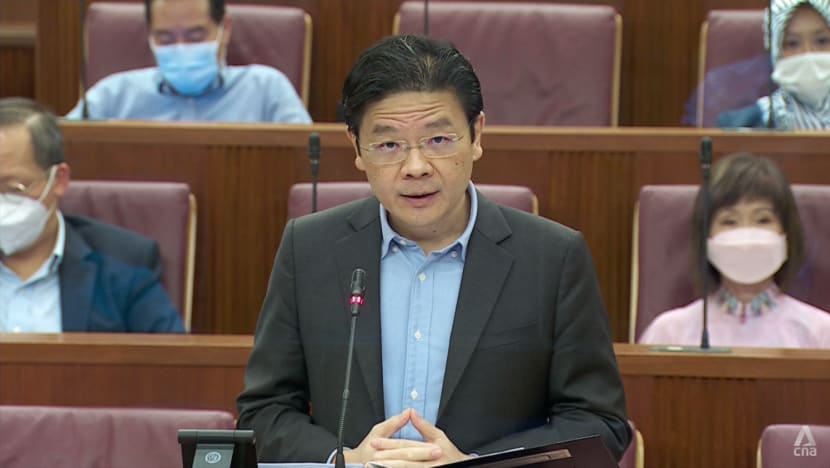Budget 2022: Social services to be integrated to more effectively help lower-income families

Finance Minister Lawrence Wong delivers the Budget 2022 statement in Parliament on Feb 18, 2022.
SINGAPORE: Social services will be integrated to help uplift lower income families “more effectively”, Finance Minister Lawrence Wong said in his Budget speech on Friday (Feb 18).
This involves taking a family-centred approach to address each family’s challenges so they can keep their situation stable, become self-reliant and eventually achieve social mobility, Mr Wong said.
This will be done as the Government scales up Community Link (ComLink) which provides targeted support for families with children living in rental housing, Mr Wong said.
Each ComLink family will be partnered to develop an “action plan” that is customised to address their specific needs and aspirations, he said.
“Each family will have dedicated and trained befrienders to support them towards achieving their action plans,” he said.
These befrienders will be the bridge with other community partners and Government agencies so that families can receive timely and holistic support, he said.
“The challenges faced by lower-income families after often multi-faceted and inter-connected,” Mr Wong said.
For instance, a child could be absent from school because of employment or health issues faced by his or her parents, he said. In such cases, it is not enough to provide financial assistance.
“We also need to address the underlying issues faced by the family and support them in taking steps to achieve sustainable change,” he said.
RENTHINKING HEALTHCARE DELIVERY
Mr Wong also spoke on the need for the Government to fundamentally rethink the way it delivers healthcare, noting that the trajectory of its healthcare expenditure is “not sustainable”.
The Government’s healthcare expenditure has tripled from S$3.7billion in 2010 to S$11.3 billion in 2019, he said.
The Government will spend about S$27 billion, or around 3.5 per of GDP, by 2030 if the current healthcare spending excluding COVID-19-related expenditure continues to increase at a similar rate over the coming decade, he noted.
An important aspect of rethinking healthcare delivery is to bring care closer and make it more accessible to the community, he said.
“A strong primary care sector will serve as the bedrock of our healthcare system and allow us to go upstream for preventive care and better manage chronic conditions,” he said.
This can improve Singaporeans’ quality of life and reduce the risk of costly downstream complications, he said.
“It will also enable our hospitals to focus on complex conditions and emergency cases,” he said.
The healthcare ecosystem must be restructured over the longer term to centre the healthcare system around the patient, he said.
It must be designed to keep patients healthy and provide care in the most appropriate setting, he added. For instance, patients with diabetes will require dietary and lifestyle changes to manage the condition well, which is “best coordinated” by a trusted primary care doctor.
To do so, closer partnerships need to be built, especially between healthcare clusters and general practitioners, he said.
Healthcare IT systems needs to be integrated so that information can flow beyond hospitals to community healthcare providers to “enable quality care and maximise convenience” to patients, he said.
Referring to the changes as a “Healthier SG” strategy, Mr Wong said it will entail a review of the Government’s resourcing approach and healthcare financing schemes, as well as the need for more upstream investments in preventive healthcare.
“We are thinking through this ‘Healthier SG’ strategy carefully,” he said.
“This will be a challenging long-term effort involving many components and stakeholders. But if we succeed, we will be able to use our resources more effectively while providing quality care and enabling Singaporeans to stay healthy.”
The Ministry of Health will elaborate on the plans at its Committee of Supply session.














